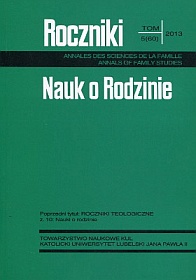Pomoc rodzinie z problemem patologicznego hazardu – przykłady polskie i program kanadyjski
Abstrakt
The article discusses the forms of aiding families with the pathological gambling problem that are available in Poland as well as the example of the Canadian program. Among others, the results are presented of studies conducted in 2011 and 2012 that aimed at making a diagnosis of the aid resources for the gambling problem in Poland. In the studies 801 institutions took part that conduct therapy of addictions. Among them 120 declared that they offer aid to families affected by pathological gambling. In the forms of aid individual therapy, counseling and education dominate. Less than half of the institutions have a therapeutic program worked out for pathological gamblers, and the remaining institutions conduct therapy according to programs prepared for people addicted to psychoactive substances. Addiction therapists say there is a great need of improving their qualifications in the sphere of supporting people with behavioral addiction – including pathological gambling.
Bibliografia
Badora B., Gwiazda M., Herrmann M., Kalka J., Moskalewicz J.: Oszacowanie rozpowszechnienia oraz identyfikacja czynników ryzyka i czynników chroniących w odniesieniu do hazardu, w tym hazardu problemowego (patologicznego) oraz innych uzależnień behawioralnych, Warszawa: CBOS 2012.
Beattie M.: Koniec współuzależnienia, Poznań: Media Rodzina 2002.
Boutin C., Ladouceur R.: Y a-t-il un joueur dans votre entourage? Tout ce que les proches doivent savoir, Paris: Les Éditions de l'Homme 2006.
Celebucka J.: Terapia dla hazardzistów w Toruniu, „Świat Problemów” 2011, nr 7, s. 31-34.
Custer R.: When luck runs out: Help for compulsive gamblers and their families, New York: Facts on File 1985.
Derwich-Nowak A.: Patologiczny hazard, Warszawa: Difin 2010.
Desrosiers P., Jacques Ch.: Les services en jeu pathologique dans les centres de réadaptation en dépendance. Guide de bonnes pratiques et offre de services de base, Québec: L'Association des centres de réadaptation en dépendance du Québec (ACRDQ) 2009, s. 20.
Duda-Kubik A.: Nasze doświadczenia, „Terapia Uzależnień i Współuzależnienia” 2012, nr 1, s. 16-18.
Fudała J.: Polskie lecznictwo odwykowe w liczbach, „Świat Problemów” 2012, nr 11, s. 5-9.
Fundacja Totalizatora Sportowego Milion Marzeń: Sprawozdania merytoryczne za rok 2010 i 2011.
Guide de bonnes pratiques et offre de services de base, Québec: L'Association des centres de réadaptation en dépendance du Québec (ACRDQ) 2009.
Informacja o realizacji ustawy o grach hazardowych w 2011 roku, Warszawa: Ministerstwo Finansów 2012.
Kisiel M.: Zajęcia psychoedukacyjne dla współuzależnionych, Warszawa: Instytut Psychologii Zdrowia PTP 2001.
Ladouceur R., Gaboury A., Duval C.: Modification des verbalisations irrationnelles pendant le jeu de roulette américaine et prise de risque monétaire, „Science et Comportement” 1988, nr 18, s. 58-68.
Ladouceur R., Mayrand M., Dussault R., Letarte A., Tremblay J.: Illusion of Control: Effects of Participation and Involvement, „The Journal of Psychology” 1984, nr 117, s. 47-52.
Lesieur H. R., Blume S. B.: The South Oaks Gambling Screen (SOGS): A new instrument for the identification of pathological gamblers, „American Journal of Psychiatry” 1987, nr 9, s. 1184-1188.
Lelonek B.: Uzależnienie od hazardu – zmienne psychospołeczne współwystępujące z nałogowym graniem, „Przegląd Psychologiczny” 2010, nr 53(2), s.177-194.
Letarte A., Ladouceur R., Mayrand M.: Primary and Secondary Illusory Control and Risk-Taking in Gambling (Roulette), „Psychological Reports” 1986, nr 58, s. 299-302.
Materiały konferencyjne Międzynarodowej konferencji „Psychoterapia hazardzistów i ich rodzin-doświadczenia europejskie”, Kraków, KSTU 27-28.09.2012.
Miller W. R., Rollnick S.: Wywiad motywujący, Kraków: Wydawnictwo Uniwersytetu Jagiellońskiego 2010.
Ogińska-Bulik N.: Uzależnienie od czynności. Mit czy rzeczywistość?, Poznań: Difin 2010.
Pomianowski R.: Zadłużenie i niewypłacalność. Problemy osoby zadłużonej, [w:] Hazard, historia, zagrożenia i drogi wyjścia, red. B. Woronowicz, Warszawa: Media Rodzina 2012, s. 197-231.
Seligman M. E. P.: Optymizmu można się nauczyć, Poznań: Media Rodzina 2010.
Szczepańska H.: Trening asertywności dla współuzależnionych (TAW) poradnik terapeuty, Warszawa: Instytut Psychologii Zdrowia i Trzeźwości PTP 1996.
Woronowicz B.: Hazard i rodzina, [w:] Hazard, historia, zagrożenia i drogi wyjścia, red. B. Woronowicz, Warszawa: Media Rodzina 2012, s. 169-196.

